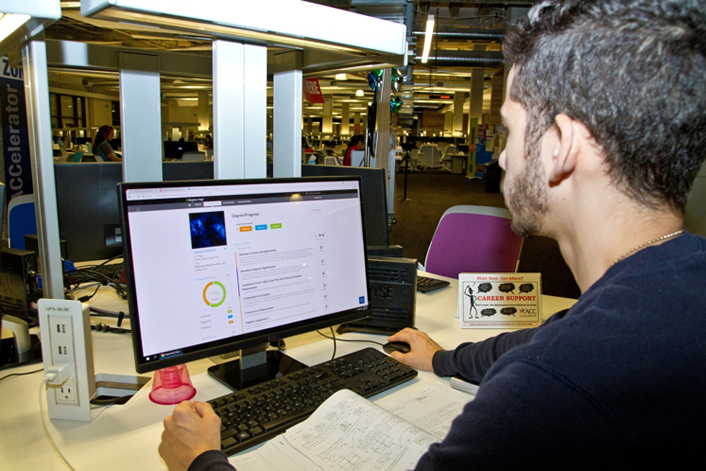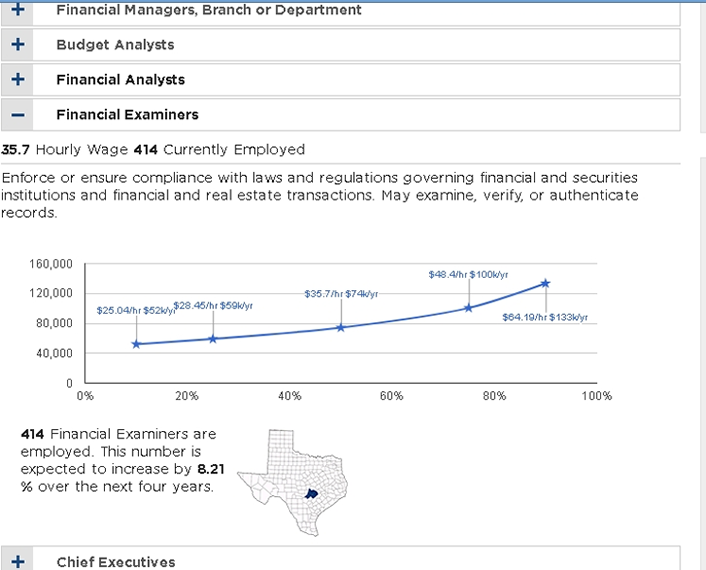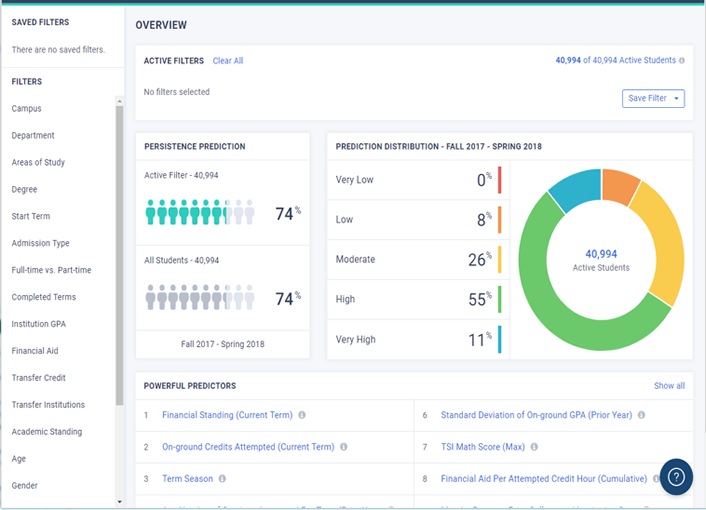Key Takeaways
-
In 2011, funding from an Integrated Planning and Advising for Student Success (iPASS) grant allowed Austin Community College to begin the work needed to revamp and improve the student experience.
-
Guided Pathways and implementation of Degree Map helped transform the college's approach to advising from a generalist to an Areas of Study model.
-
In 2017, the Bill and Melinda Gates Foundation chose ACC as an institution to pilot the Inside Track coaching model, which teaches advisors how to advise.
-
From fall 2016 to spring 2017, analysis revealed an 11 percent increase in persistence for students who used Degree Map, in comparison to similar students who did not.
In 2011, funding from an Integrated Planning and Advising for Student Success (iPASS) grant allowed Austin Community College (ACC) to begin the work needed to revamp and improve the student experience. The vision from the outset was to provide students with mobile-friendly, easy-to-use, online technology that would inform students which courses to take (figure 1), provide the analytics to illuminate their educational path, and ultimately, allow more time for higher level advising that would result in increased student engagement and persistence through graduation. This article describes our journey.

Getting Started
When we began, advising sessions were predominantly recorded via pen and paper. This lack of technology created time constraints that limited the student experience; much of the session went to course selection and registration assistance, hamstringing the advisor's capacity for deeper communication.
ACC conducted an ethnographic study with Civitas Learning, observing more than 200 hours of ACC student-advisor interactions. After interpreting advising needs through observation and study, multidisciplinary team meetings soon followed. Participants included ACC President and CEO Richard Rhodes, Vice President of Student Services Virginia Fraire, advisors, counselors, and representatives from Admissions and IT, along with Civitas data engineers, designers, and data scientists. After discussing multiple details, ACC agreed to serve as a beta institution for testing Degree Map [https://www.civitaslearning.com/degree_map/], designed to simplify degree planning.
The version of Degree Map that debuted at ACC included a feedback button, allowing advisors to provide real-time suggestions to Civitas as they developed the tool. Fraire encouraged advisors to adopt the system, and within 60 days it became apparent that a transformation had begun.
Initial improvements appeared immediately. The Student Services deans saw a drastic reduction in alleged advising errors, for example. When an error was made, the advising log housed in Degree Map streamlined the investigation. Also, advisors no longer had to search several screens for information needed to help students, and students could access their personal advising notes (see figure 2).

Campus traffic decreased noticeably as students began to self-advise. Freed of copious questions around degree plans and registration, advisors could hold lengthier discussions covering students' long-term goals and short-term needs. Degree Map clearly indicated the percentage of requirements a student had completed toward graduation, not only for their declared major but also for other degrees and certifications (figure 3). This led to ACC's most welcome outcome — an increased graduation rate.

Using iPASS funding and Civitas technology, Fraire began the transformation of Student Services at ACC. With direction from Provost Charles Cook, ACC began to explore Guided Pathways for the whole college.
ACC Guided Pathways
In August 2015, 24 ACC faculty, staff, and students established the Futures Institute "to explore how the college might restructure its programs and services into 'guided pathways' to help more students finish college on time and well-prepared for employment, career advancement, or university transfer." The Futures Institute read the book Redesigning America's Community Colleges: A Clearer Path to Student Success by Thomas Bailey, Shanna Smith Jaggars, and Davis Jenkins. The book was also purchased and distributed throughout the college. Members of the Futures Institute visited colleges that had successfully implemented Guided Pathways, such as Miami Dade College, City Colleges of Chicago, and Sinclair Community College. The group returned and presented their findings and recommendations to ACC Campus Advisory Committees and distributed their report widely within ACC through the Faculty and Staff News Digest.
By adopting the following principles, ACC faculty and staff witnessed a dramatic change:
- Help students with career exploration and goal setting from the start
- Require every student to have a clear roadmap to completion, further education, and job advancement — program maps
- Ensure that program learning goals are clearly articulated and aligned with requirements for success in further education and employment, engaging employers and university colleagues to do so
- Simplify choices for students, using program maps as the default for degree plans required of every student, but customizable with support from an advisor
- Give students predictable course schedules that make it easier to organize their lives around school and graduate on time — degree planning
- Redesign the onboarding process to help entering students who are undecided about a major to choose a field of study as quickly as possible through Areas of Study information sessions
- Integrate teaching of foundational skills with college-level gatekeeper courses for major program areas to enable academically unprepared students to successfully enter a program of study as soon as possible — paired courses
- Monitor student progress on their program plans, providing frequent feedback and support as needed through caseload management
- Build bridges into college programs from high schools, adult basic education, and other feeders as opposed to preparing students for college generally
Areas of Study Academic Advising
ACC grouped its 200-plus degree and award certificate, AA, AS, or AAS programs into 10 Areas of Study:
- Arts, Digital Media, and Communications
- Business
- Computer Science and Information Technology
- Culinary, Hospitality, and Tourism
- Design, Manufacturing, Construction, and Applied Technologies
- Education
- Health Sciences
- Liberal Arts
- Public and Social Services
- Science, Engineering, and Math
Both Instruction and Student Services reorganized to align with this structure, with instructional departments organized under Areas of Study deans. Previously, advisors were generalists and expected to know the details needed to advise students for all areas. Sometimes faculty complained that advisors made mistakes because they had to know too many degree plan nuances. To address this problem, advisors instead specialized in Areas of Study. In fall 2016, 15 new advisors were hired to reduce advising caseloads and support our move from a reactive model to a proactive case-management model. Fraire created the director of Academic and Career Advising position, which had the responsibility to lead the advising transformation. Co-author and former Advising Supervisor Kathy James filled that position.
The Advising Process
Advisors, counselors, and faculty represent each Area of Study. All first-time-in-college (FTIC) students with fewer than 12 credits are assigned to an advisor or counselor. The new structure provides a foundation for systemic change and will help us create an optimal environment for students to succeed. Advising involved:
- Caseload management of 150–300+ students
- Advising by appointment and on a designated walk-in basis
- A holistic advising approach
- An academic coaching model
Training
James developed a six-week intensive training program for advisors that took them through the essentials of advising. She also coordinated academic and workforce updates each semester, allowing instructional department chairs to present program information, requirements, and changes to a broad audience of those involved in advising students.
In 2017, the Bill and Melinda Gates Foundation chose ACC as a school to pilot the Inside Track coaching model. ACC had provided substantial training on what to advise, but Inside Track began the work of teaching ACC advisors how to advise. Advising supervisors began Inside Track coaching training first and found it began to make a substantial difference in their approach. Advisors who completed the training reported the Inside Track methods allowed them to better connect with students. One advising supervisor related that after a student session, the student wanted to know his name so that he could return to see him for follow-up appointments. Through that interaction, his job satisfaction increased dramatically.
Training for students began as well. In fall 2015, an administrative rule passed ACC's Academic and Student Affairs Council requiring all students with less than 12 college credit hours to enroll in a three-hour Effective Learning Strategies course their first semester. A Student Services advisor supports the course, which is taught by Student Development faculty and covers the career module and Degree Map technology.
Enrollment Management
With Guided Pathways revolutionizing the way ACC serves students, the college recognized the need to initiate pathways principles at the front door. As a result, our enrollment process became more intentional and student-friendly. Following creation of the Enrollment Management division, strategic enrollment goals were developed by a unified team consisting of: recruiting and enrollment, admissions and registration, financial aid, and the student helpdesk call center. Under the leadership of Enrollment Management Associate Vice President Melissa Curtis, the application process was streamlined from 12 steps to four. Enrollment advisors implemented Ellucian CRM Recruit to manage and assist prospective students, with the goal of reducing the number slipping through the cracks between application and registration. Frequent communication with new students, plus the data available from the CRM system, have affected the number of students completing the registration process and highlighted improvements still needed. Said Curtis:
"I call the new enrollment process 'high tech and high touch.' We leverage technology for accuracy and efficiency, while still emphasizing the importance of human engagement. The students need to feel they are welcomed here."
Area of Study (AoS) Information Sessions
Another engagement approach to encourage registration involved creation of Area of Study information sessions, which last about two hours. The collaborative sessions, hosted by faculty coordinators and advisors, became a requirement for students with less than 12 college credits, who cannot register for classes until after completing a session. Transfer students with 12+ credits are also encouraged to attend.
Area of Study information sessions represent the final step in the student enrollment process. Academic advisors, counselors, faculty coordinators, and student ambassadors representing each of the 10 Areas of Study present an overview of programs leading toward an associate degree, a career-ready certificate, or a seamless transfer to a four-year university (figure 4). Each instructional department designs a website to coordinate program options with student goals.

Data Analytics
To focus the advisors' efforts and move from reactive advising to proactive advising, ACC hired Associate Vice President of Student Success and Data Analytics Guillermo Martinez. He established a team to glean data from Civitas Illume to inform student interventions. Ellucian CRM Advise implementation began in fall 2017.
Results
In fall 2016, ACC transitioned to the next generation of Degree Map. Illume Impact, from Civitas Learning, measured the impact on student persistence from fall 2016 to spring 2017. It revealed an 11 percent increase in persistence for students who used Degree Map, in comparison to similar students who did not. This persistence lift equates to 1,492 additional persisting students and an estimated $1.36 million in retained revenue in just one semester.
The lift was even greater for students in the bottom quartile, having the lowest probability to persist (18.5 percent), and for online students (17.4 percent). An additional lift of 12.3 percent was observed for students using the application four or more times. We credit many new features and integrations that make Degree Map a one-stop shop for students and advisors to see degree progress; it also enables more collaboration across the institution to support each student.1 See figure 5.

Future Changes
In spring 2017, ACC President Richard Rhodes signed a faculty advising rule stating that all students enrolling at ACC will be assigned both a Student Services advisor and a faculty advisor. The Student Services advisor will have primary responsibility for the student until they reach 30 credit hours, and then the advising responsibility shifts to the faculty advisor. This represents a substantial commitment to ensure students have subject matter experts proactively working with them from completion of 30 hours to completion of their studies at ACC — an investment that we know is well worth it.
Note
- "Civitas Learning Brief," Issue 2, April 2017
Antonia Ceballos-Cruz is coordinator, Integrated Advising Training, Student Services, Austin Community College.
Kathy James is director, Academic and Career Advising, Student Services, Austin Community College.
© 2017 Antonia Ceballos and Kathy James. The text of this article is licensed under Creative Commons BY-NC-ND 4.0.
